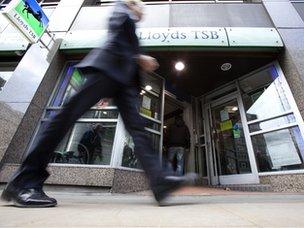Lloyds almost off addiction to taxpayer loans
- Published
- comments

There was some good news for taxpayers in Lloyds' latest results.
The bank which became more dependent than any other on loans from the Bank of England and the Treasury at the height of the 2007-8 financial crisis has almost completely repaid what it owes taxpayers.
There is only £12.9bn of Treasury-guaranteed loans left for Lloyds to repay, which is down 45% from the end of the year.
And that residual £12.9bn compares with an eyewatering peak of £157.2bn of taxpayer-supported borrowing in December 2009 (consisting of £107bn from the Bank of England's Special Liquidity Facility, which was underwritten by the Treasury, and £50bn from the Credit Guarantee Scheme, also guaranteed by the Treasury).
Lloyds says it has borrowed enough from commercial lenders to be confident of paying off the rest of what it owes by the end of the year. "Phew", you might say.
That said, Lloyds - like other UK banks - did borrow £11.2bn of emergency three year loans from the European Central Bank earlier this year. So this very British bank will, by the end of the year, be more dependent on help from eurozone taxpayers than from British ones.
However, when banks wean themselves off the life-support of loans from the state and the central bank, it is a mixed blessing for the economy - in that banks always do this, in part, by shrinking the loans and investments they make.
In other words, during the period when loans to taxpayers are repaid, there is less credit available in the economy.
Lloyds has tried to minimise the contraction in the provision of vital credit by shrinking what it calls its non-core portfolio of assets - and in the three months to the end of March, it says it increased important lending to small businesses by a net 4%, compared with a contraction in the overall market of 4%.
But no analyst in the world believes that banks can end their addiction to state-supported loans without there being a negative effect on credit provision for households and businesses.
Which is why the European Central Bank's trillion euros of emergency three-year loans to banks is a mixed blessing for the eurozone economy.
Although it prevented an acute credit crunch and a devastating sequence of banking collapses, instead there is an extended period of minimal growth in credit provision - which makes it very hard for the eurozone to climb out of recession.